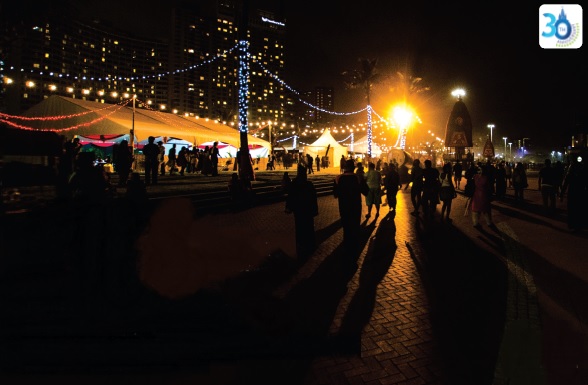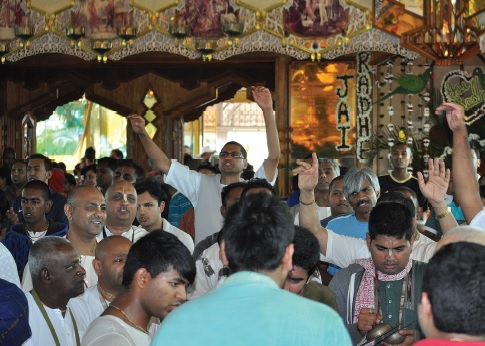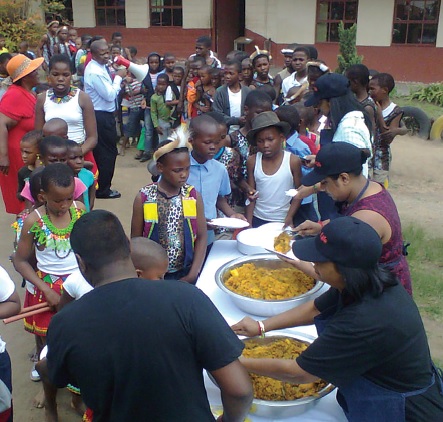
A close-up look at three of the temple’s thirty-two departments.
I have just returned home after a festival at the temple and still feel the positive energy, warmth, and love shared among many friends who have now become more like family. As I entered the temple this evening, the sound of the conch shell resonated and an emphatic melody of devotional song permeated the air as the altar opened for the arati . The temple was packed, and the many friends around me clapped their hands, danced, and sang in glorification of Lord Caitanya Mahaprabhu. Under the dim temple lights, all focus was on the magnificent deities of Sri Sri Radha-Radhanatha. A mood of devotion and a spirit of togetherness pervaded the atmosphere.
I was fortunate to be raised in Krishna consciousness. My parents were Hare Krishna devotees from before the opening of the Sri Sri Radha- Radhanatha temple, and I have never missed a Rathayatra festival or a major festival at the temple. I therefore feel a close connection to the congregation, the driving force behind the temple’s operations.
Although ISKCON Durban has over thirty departments, I feel a special connection to three pillars of the temple: congregational development, the Rathayatra festival, and the Food For Life initiative. It’s easy to identify a connection between the three: the temple’s emphasis on growing and nurturing the congregation has produced an inspired congregation whose spirit of service spearheads outreach programs like Rathayatra and Food For Life.
These three departments have combined to become a powerhouse that makes ISKCON Durban an effective spiritual organization. Let’s take a look at each one.
Congregational Development
The Sri Sri Radha-Radhanatha temple is the flagship ISKCON temple in South Africa. In the KwaZulu- Natal province, where Durban is located, there are over six hundred initiated devotees and thousands of Krishna conscious followers who practice devotion at home. Many of these devotees form an integral part of the operations and sustainability of the temple. Seventy percent of the temple management team consists of congregation devotees, and many nonresident devotees perform other temple services as well. An important vision of the management team is for the temple to be felt an extension of the home, and the home an extension of the temple. With this mood the members of the congregation come together in service and friendship.
Saṅga (association) is pivotal in the development of the temple community. Sunday Love Feasts at the temple are always special. Devotees and first-time visitors converge to participate in bhajanas, observe the arati ceremony of Their Lordships Sri Sri Radha-Radhanatha, acquire understanding of Vedic scriptures, and enjoy delicious, purifying prasada. Over five hundred people attend these weekly programs.
 Through interaction at the Sunday program, festivals commemorating special holy days, and regular group meetings, devotees are offered a platform to form friendships. In KwaZulu-Natal there are thirty groups known as Nama-hattas (“marketplaces of the holy name”). These weekly evening programs are hosted in various geographical areas, and many devotees look forward to them as the highlight of their week.
Through interaction at the Sunday program, festivals commemorating special holy days, and regular group meetings, devotees are offered a platform to form friendships. In KwaZulu-Natal there are thirty groups known as Nama-hattas (“marketplaces of the holy name”). These weekly evening programs are hosted in various geographical areas, and many devotees look forward to them as the highlight of their week.
The groups range from twenty to eighty devotees. The size and nature of the Nama-hattas allow for personal association, spiritual nourishment, and forging of relationships with like-minded people. The gettogethers mirror the Sunday Love Feast, but have a more interactive and relaxed flavor. The aim of the Nama-hatta program is to provide knowledge of God from the authentic Vedic scriptures and give people, especially from the Hindu community, the satisfaction of eradicating doubts and misconceptions. They see the philosophy in action when they chant Krishna ’s names together and dance in bliss.
The Nama-hatta programs also serve to accommodate those curious about the Vedas but unable to visit the temple. The regular program attendees invite friends and neighbors to join in, so by sharing love and goodwill within the community there is a constant cycle of receiving and giving Krishna consciousness.
A strong culture of service exists within the congregation, its members serving in all thirty-two departments of the temple and managing a few by themselves. The deity worship department, an important focus of the temple, is supported by the congregation’s commitment to high standards of worship. It is always a pleasure to see a team of eager devotees enjoying each other’s company while offering service to the temple. The true spirit of the congregation comes alive during major festivals, when members enthusiastically band together as strategic and operational managers.
Seminars presented by dozens of visiting gurus to South Africa throughout the year further advance the association, knowledge, and spirit of service. The congregation greatly supports the kirtana evenings, the seminars on Srila Prabhupada’s books, the workshops, and the retreats. Durban is the home of the Bhaktivedanta College of Education and Culture, so devotees are privileged to register for systematic understanding of Vedic scripture. The College offers formal, accredited study programs.
In a remarkable synergy, the congregation reflects the temple, and the temple shapes the congregation. The members of the congregation are actively involved in the temple and spare no effort in forging ahead to present Krishna consciousness in innovative and exciting ways within the greater community.
Rathayatra : The Festival of Chariots
Women in brightly colored saris dance to the beats of traditional musical instruments, and flags marked with Lord Jagannatha’s face sway swiftly in the warm air as three beautiful flower-decorated chariots glide along Durban’s promenade. Scottish bagpipers, African gumboot dancers, and Indian classical dancers escort the chariots along the route. For twenty-seven years ISKCON Durban has hosted a multicultural event that attracts over half a million guests. Although the temple celebrates more than forty festivals a year, the Rathayatra ranks high on the temple calendar of events.
It all began in 1981 on Durban’s North Coast, when for the first time onlookers witnessed the exotic ancient festival. Thereafter devotees focused on building the temple, and the Rathayatra festival was postponed. Three years after the opening of the Temple of Understanding, they again promoted culture and peace through the chariot festival.
Under Indradyumna Swami’s leadership, the chariots of Lord Jagannatha, Lord Baladeva, and Subhadra Devi once again took to Durban’s streets. At the peak of the apartheid regime, during the Christmas period in 1988, throngs of eager participants and tourists gathered to behold the much publicized event. Even before the demise of apartheid, the Rathayatra festival broke racial barriers, as the mayor of Durban granted ISKCON permission to host an all-inclusive event on prominent beachfront land.
Since then, the festival has grown in magnitude and exciting features have been added. The four-day event is held over the Easter weekend on Durban’s Golden Mile, a holiday hub for international tourists and visitors from other cities in South Africa. The climate is ideal for enjoying the surf, and the seashore festival attracts those enjoying the holiday spirit.
Rathayatra 2013 stands out for having gained support and recognition from the local government. The slogan “Culturally Many, Spiritually One” attracted people from all racial backgrounds to experience Krishna consciousness in a unique way through interfaith discussions, yoga, and rock bands. During the “Rainbow Splash,” guests splattered colored powder on each other in keeping with the festival theme. For the first time, the Philharmonic Orchestra (famous in South Africa) played Hare Krishna tunes and the KwaMashu choir sang the Hare Krishna maha-mantra.
The carnival atmosphere continues every year, as the festival grounds are turned into a kaleidoscope of color and flavor. Imagine walking through a decorative coliseum of fifty-two tents. The vegetarian food stalls offer tantalizing Eastern and Western treats. A Vedic village provides fun activities to stimulate the children’s spiritual enquiry. The main cultural arena is a large tent that hosts a twelve-hour nonstop cultural show. Daily at the temple, cooks prepare a hundred large pots of prasada on open wood fires to be transported in insulated trucks to the festival grounds, where free meals are served throughout the day.
The three majestic chariots take to the streets twice during the festival. Even hotel guests curiously peering through windows are inspired to pull on the chariots’ ropes and sing and dance. The evening parade lights up the night sky as the fifteenmeter- high chariots are enveloped with lights.
By creating a united platform to worship God, the Festival of Chariots spreads a message of peace and goodwill to the people of South Africa. When South African society was indoctrinated to see differences, the festival was a stimulant to see that we are all children of God. On this platform lies abundant peace and happiness.
Food for Life
Eager children run out of their homes with cups and bowls as they hear the chanting of the maha-mantra. Tiny feet race to the finish line, eager to be first in queue to receive a warm plate of wholesome sanctified vegetarian food. Food For Life, in affiliation with ISKCON South Africa, distributes over ten thousand meals a day across South Africa. This is due to the efforts of twenty-one teams. Food For Life delivers prasada meals not only to the needy, but also to 250,000 guests at the annual Rathayatra festival.
In 1997, Kapiladeva Dasa, who started the Food For Life project in Durban, was instrumental in providing meals for 50,000 schoolchildren in a massive Food For Life initiative – the Festival of the Children of the Rainbow Nation, attended by former president Nelson Mandela and a highlight in the history of Food For Life in South Africa.
A large percentage of South African government schools serve children at the lower end of the socio-economic scale. Food For Life embarked on an outreach project to feed these children. The devotees also deliver prasada to children who are physically or mentally challenged and attend special-needs institutions. The school staff and the students welcome these visits to their campuses with big smiles and open hearts.
Food For Life has 195 volunteers across South Africa. Although many have family and work commitments, they sacrifice to offer this loving, compassionate service. Lakṣminatha Dasa, who has been involved in Food For Life for the past twenty years, recently attained the milestone of having served over ten million plates of prasada during this period.
“The most attractive thing,” Lakṣminatha says, “is to see the smiles and joy on the faces of children when we distribute prasada in the rural areas.”
Raised as one of eight children in a home without a stable income, he understands hardship.
 “During the 1960s we experienced poverty,” he says. “Nobody was working, and basic needs were hard to come by. I therefore identify with families who look forward to a meal from Food For Life.”
“During the 1960s we experienced poverty,” he says. “Nobody was working, and basic needs were hard to come by. I therefore identify with families who look forward to a meal from Food For Life.”
In Durban, Food For Life is on the mayor’s hotline for disaster-relief meal distribution. The team also works closely with the South African Red Cross Society and other community-action groups. A vision of the team is to be among South Africa’s largest charitable organizations, focusing on nutrition for the body and the soul.
Although there are more than twenty state-of-the-art Food For Life kitchens across the country, the one at the Sri Sri Radha-Radhanatha temple remains special, as it all began there three decades ago. To make prasada more accessible to outlying areas, the team hopes to set up fifty more kitchens within the next two years. Surely this widespread initiative will help create a cumulative change of consciousness in all walks of South African society.
Krsangi Radhe Devi Dasi, a disciple of Indradyumna Swami, lives in Durban with her husband Muralidhara Dasa and their daughters Vraja- Sundari (age seven) and Varsana- Rani (three). She teaches English at a few universities. She serves as a member of the Sri Sri Radha- Radhanatha temple management team as communications and public relations officer. She is also passionate about educating children in Krishna consciousness and has founded and currently hosts the “Krishna’s Kids” program at the Durban temple.
